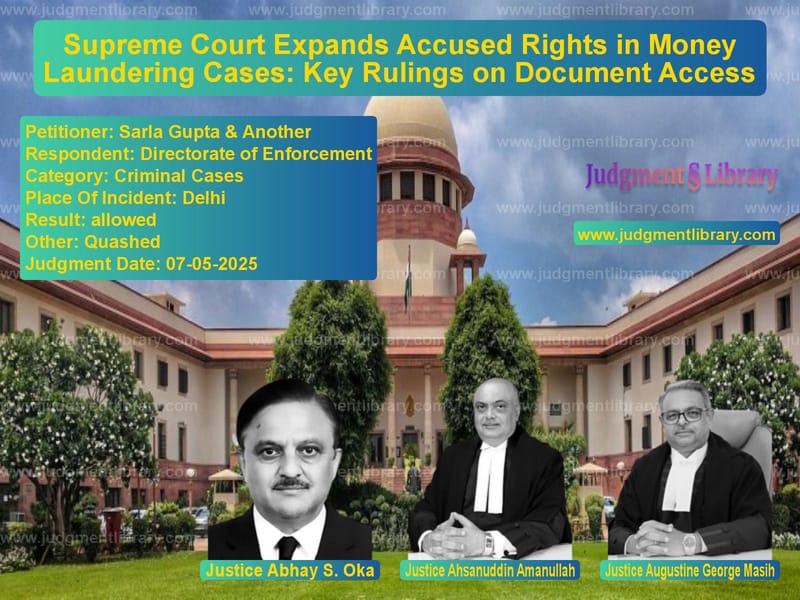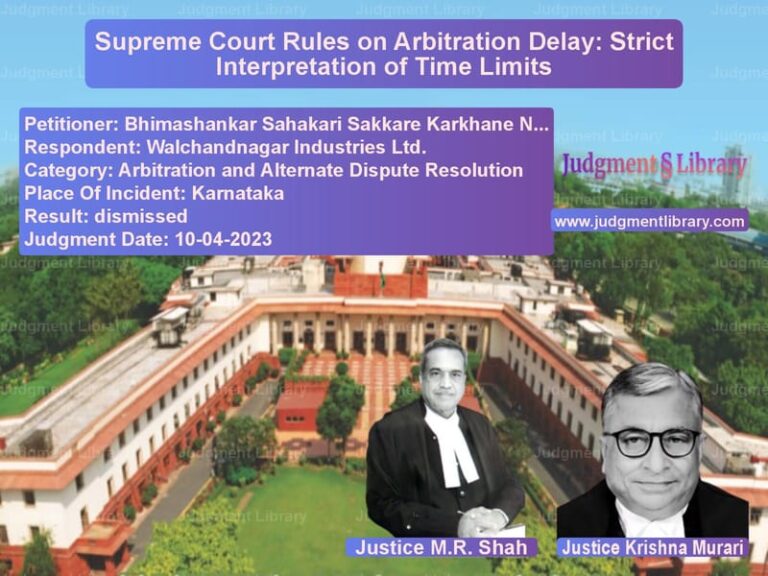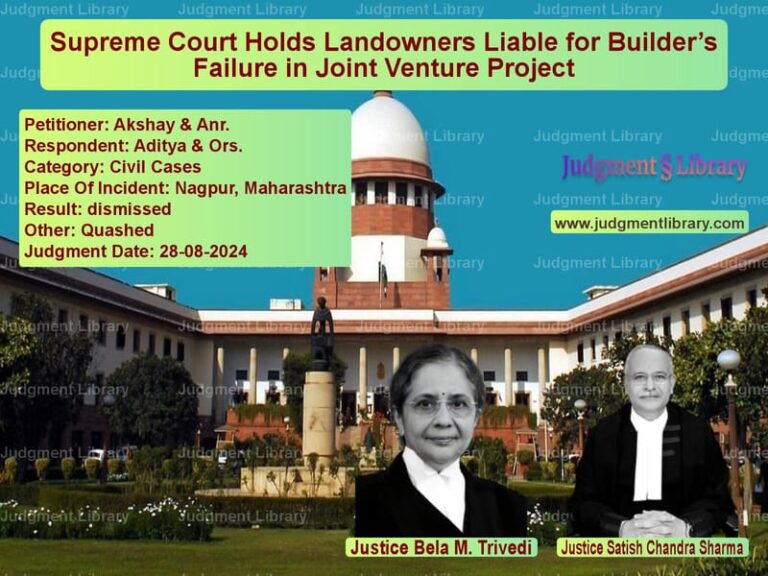Supreme Court Expands Accused Rights in Money Laundering Cases: Key Rulings on Document Access
In a landmark judgment that significantly reshapes the landscape of criminal jurisprudence under the Prevention of Money Laundering Act (PMLA), the Supreme Court of India delivered a decisive verdict on May 7, 2025, addressing crucial questions about the rights of accused persons facing money laundering charges. The judgment, delivered by a bench comprising Justice Abhay S. Oka, Justice Ahsanuddin Amanullah, and Justice Augustine George Masih, came in response to two criminal appeals that challenged the restrictive approach adopted by lower courts regarding the accused’s right to access documents during PMLA proceedings.
The legal battle centered around a fundamental question: How much access should an accused person have to documents collected during investigation, especially those not relied upon by the prosecution? The Enforcement Directorate (ED) had maintained that accused persons were only entitled to documents specifically relied upon in the complaint, while the appellants argued that this approach violated their fundamental right to a fair trial guaranteed under Article 21 of the Constitution.
The cases before the Court presented similar factual backgrounds. In Criminal Appeal No. 1622 of 2022, the appellants Sarla Gupta and others challenged the Delhi High Court’s order that upheld the Special Court’s decision denying them copies of certain categories of documents. These included documents relied upon in the complaint but not supplied, documents supplied that were illegible, and documents collected during investigation but suppressed by the prosecution. The ED had registered an Enforcement Case Information Report (ECIR) based on an FIR filed by the CBI for offenses under Section 120-B read with Section 420 of IPC and Section 13(1)(d) of the Prevention of Corruption Act.
In Criminal Appeal No. 730 of 2024, the appellants challenged the Punjab and Haryana High Court’s order that dismissed their petition seeking directions to the ED to supply copies of documents seized during raids conducted at their premises. The ED had conducted searches in August 2019 and seized various documents, but refused to provide copies, claiming that the investigation was still in progress.
Arguments Presented by the Appellants
The learned senior counsel appearing for the appellants made detailed submissions emphasizing the fundamental right to a fair trial. In support of Criminal Appeal No. 1622 of 2022, he urged that “the right under Section 207 of the CrPC is not restricted to the documents relied upon by the prosecution. The right under Section 207 to get documents includes all the documents collected during the investigation.” He further submitted that “Sections 207 and 208 of the CrPC must be complied with before the trial commences” and that “the right to get all the documents collected during the investigation flows from the right to a free and fair trial, which is guaranteed under Article 21 of the Constitution of India.”
In support of Criminal Appeal No. 730 of 2024, the counsel submitted that “relevant provisions of the CrPC mandate that the prosecution must provide copies of the relied upon documents, documents in its custody which are not relied upon, as well as the list of documents to the accused, before framing of a charge.” He particularly emphasized the unique burden placed on the accused under PMLA, stating that “in view of Section 45(1)(ii) of the PMLA, while deciding the bail application, the burden is on the accused to show that there are reasonable grounds to believe that he is not guilty of such an offence. He submitted that this is a standalone provision not found in other penal statutes.”
Arguments Presented by the Respondents
The learned Additional Solicitor General appearing for the ED countered these arguments, asserting that “all the documents relied upon by the ED in the complaint have been supplied to the appellants.” He maintained that “the accused is entitled to only the relied upon documents and has no right to seek documents with the ED which are not relied upon, at the stage of framing of charge.” Regarding the ongoing investigation in one case, he submitted that “before completion of the investigation, the appellants are not entitled to seek copies of the documents not relied upon by the ED.”
The ASG relied heavily on settled legal principles, arguing that “at the time of framing of the charge, the Court can only look into the documents that are part of the chargesheet and no other document. The accused cannot rely upon something that is not a part of the chargesheet at the time of hearing on framing of charge.” He specifically referred to Section 204 of CrPC, submitting that “in view of the said provision, the accused is only entitled to get a copy of the complaint and documents filed along with the complaint.”
The Court’s Analysis and Reasoning
The Supreme Court undertook a comprehensive analysis of the relevant provisions of PMLA, CrPC, and constitutional principles. The Court made several significant observations that form the bedrock of its judgment.
Regarding seized documents, the Court held: “When the records are seized from the custody of the accused, there is no reason why the true copies of the seized documents should not be provided on an application being made by the accused. The same is the case with the instruments or documents of title forming part of the property seized. If the documents are bulky, even soft copies thereof can be provided. Even if the seized record or documents are not relied upon in the complaint, copies must be supplied, though the accused will not be entitled to rely upon them at the time of framing the charge.”
On the applicability of CrPC provisions to PMLA proceedings, the Court observed: “There are two important provisions under the CrPC which deal with the supply of documents. The same are Sections 207 and 208 of the CrPC… Both Sections 207 and 208, on the face of it, do not specifically apply to a complaint under Section 44(1)(b) of the PMLA. But, there is no reason why the principles laid down under Sections 207 and 208 should not be applied to a complaint under Section 44(1)(b) of the PMLA. The provisions are consistent with the principles of fair play. The object of the provisions is to protect the rights of accused persons.”
The Court specifically addressed the right to access documents not relied upon by the prosecution, noting: “We hold that a copy of the list of statements, documents, material objects and exhibits that are not relied upon by the investigating officer must also be furnished to the accused. As held by this Court, the object is to ensure that the accused has knowledge of the documents, objects, etc. in the custody of the investigating officer which are not relied upon so that at the appropriate stage, the accused can apply by invoking the provisions of Section 91 of the CrPC for providing copies of the documents which are not relied upon by the prosecution.”
The Court drew a clear distinction between different stages of proceedings, holding: “At the time of hearing for framing of charge, reliance can be placed only on the documents forming part of the chargesheet. In case of the PMLA, at the time of framing charge, reliance can be placed only on those documents which are produced along with the complaint or supplementary complaint. Though the accused will be entitled to the list of documents, objects, exhibits etc. that are not relied upon by the ED at the stage of framing of charge, in ordinary course, the accused is not entitled to seek copies of the said documents at the stage of framing of charge.”
However, the Court significantly expanded the rights of the accused at the defence stage: “At the stage of entering upon defence, an accused can apply for the issue of process for the production of any document or thing in accordance with Section 233(3) of the CrPC. At this stage, he can also apply for the production of a document or a thing that is in the custody of the prosecution but has not been produced. A fair trial is a part of the right guaranteed to an accused under Article 21 of the Constitution.”
The Court particularly emphasized the heightened importance of these rights in PMLA cases due to the reverse burden of proof: “As compared to traditional penal statutes, at the time of trial of the offence under the PMLA, there is a huge negative burden put on the accused. Therefore, it is all the more necessary that sub-section (3) of Section 233 of CrPC should be liberally construed in favour of the accused. The reason is that the constitutional validity of Section 24 has been upheld on the ground that the accused has a full opportunity to show that he has not violated the provisions of the PMLA.”
Regarding bail applications under the stringent Section 45(1)(ii), the Court held: “At the time of hearing of an application for bail governed by Section 45(1)(ii) in connection with the offences under Section 3 of the PMLA, an accused is entitled to invoke Section 91 of the CrPC seeking production of unrelied upon documents.” However, the Court balanced this right with investigative needs: “If investigation or further investigation in progress, the ED is entitled to raise objection to production of documents sought by the accused on the ground that if the documents are disclosed at this stage to the accused, it may prejudice the investigation. Only if the Court after perusing the documents is satisfied that the disclosure of the documents at that stage may prejudice the ongoing investigation, it can deny the prayer for the production of such documents.”
Conclusion and Directions
The Supreme Court allowed both appeals and issued specific directions. In Criminal Appeal No. 1622 of 2022, the Court directed that “the ED is directed to provide soft or legible copies of all the documents produced along with the complaint, which have not been supplied till today within a period of one month from today.” In Criminal Appeal No. 730 of 2024, the Court directed that “the ED to supply true copies of the documents seized from the premises of the accused within a period of one month from today. It will be open for the ED to provide soft copies of the said documents.”
This judgment represents a significant recalibration of the balance between the extensive powers granted to enforcement agencies under PMLA and the fundamental rights of accused persons. By recognizing the necessity of document access for mounting an effective defence, particularly in cases involving reverse burden of proof, the Supreme Court has reinforced the constitutional guarantee of a fair trial while acknowledging the special nature of money laundering investigations.
Petitioner Name: Sarla Gupta & Another.Respondent Name: Directorate of Enforcement.Judgment By: Justice Abhay S. Oka, Justice Ahsanuddin Amanullah, Justice Augustine George Masih.Place Of Incident: Delhi.Judgment Date: 07-05-2025.Result: allowed.
Don’t miss out on the full details! Download the complete judgment in PDF format below and gain valuable insights instantly!
Download Judgment: sarla-gupta-&-anothe-vs-directorate-of-enfor-supreme-court-of-india-judgment-dated-07-05-2025.pdf
Directly Download Judgment: Directly download this Judgment
See all petitions in Money Laundering Cases
See all petitions in Bail and Anticipatory Bail
See all petitions in Fraud and Forgery
See all petitions in Fundamental Rights
See all petitions in Legal Malpractice
See all petitions in Judgment by Abhay S. Oka
See all petitions in Judgment by Ahsanuddin Amanullah
See all petitions in Judgment by Augustine George Masih
See all petitions in allowed
See all petitions in Quashed
See all petitions in supreme court of India judgments May 2025
See all petitions in 2025 judgments
See all posts in Criminal Cases Category
See all allowed petitions in Criminal Cases Category
See all Dismissed petitions in Criminal Cases Category
See all partially allowed petitions in Criminal Cases Category







